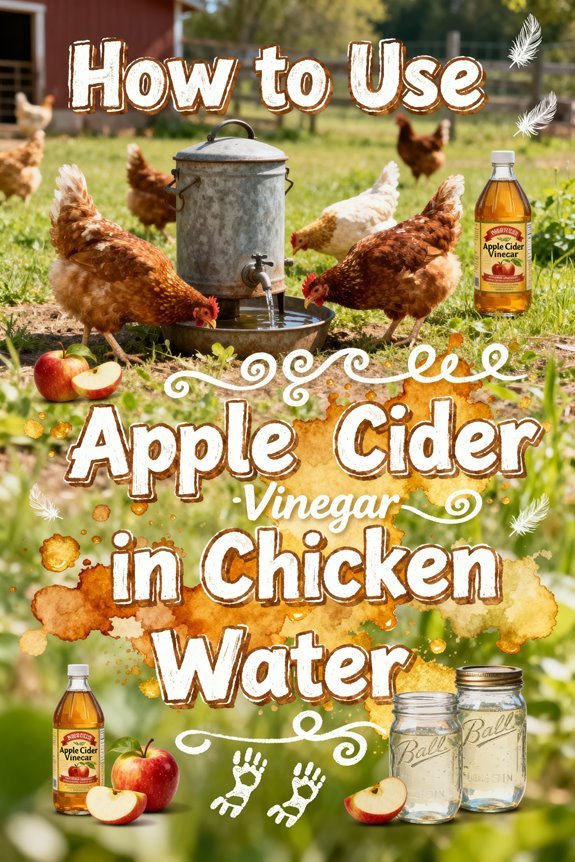How to Use Apple Cider Vinegar in Chicken Water
Add raw, unfiltered apple cider vinegar to your chickens’ water at a ratio of 1 tablespoon per gallon, administered 2-3 times weekly. Use plastic or stoneware containers to prevent corrosion, and guarantee your flock has access to regular water sources. This supplement optimizes digestive health, boosts immunity, and improves eggshell quality when properly dosed. While these basic guidelines will get you started, proper timing and monitoring are essential for maximizing ACV’s benefits.
Benefits of Apple Cider Vinegar for Chickens
Apple cider vinegar offers extensive health benefits for chickens, primarily through its ability to optimize digestive function and boost immune response. By balancing gut health and pH levels, it creates an environment that inhibits harmful bacteria while promoting nutrient absorption. You’ll find that ACV’s natural antibacterial properties help protect against common infections like E.coli and coccidiosis.
The vinegar’s potassium content strengthens cellular walls and improves calcium absorption, leading to stronger eggshells and enhanced feather quality. You’ll notice faster feather regrowth and improved plumage sheen in chickens receiving regular ACV supplementation. Additionally, it aids in controlling internal parasites by creating an acidic environment that impairs worm development. The “mother” in unpasteurized ACV provides beneficial bacteria that support digestive efficiency and overall immune system function. However, it’s important to note that excessive use can be detrimental since highly acidic properties may irritate the digestive tract.
Selecting the Right Type of Apple Cider Vinegar
When selecting apple cider vinegar for your chickens, three key factors determine its therapeutic value: processing method, presence of the “mother” culture, and organic certification status.
Choose raw, unfiltered ACV containing the “mother” – a cloudy substance rich in beneficial bacteria and enzymes that supports your flock’s gut health and immunity. Filtered varieties lack these probiotic benefits. Organic certification guarantees your ACV comes from pesticide-free apples and typically contains a more diverse microbial community, including beneficial Acetobacter and Komagataeibacter species. For the best preservation of active compounds, select ACV packaged in dark glass bottles.
You’ll want to avoid products with artificial additives or sweeteners that could harm your chickens. The ideal choice is organic, raw, unfiltered ACV with the mother intact. Leading brands like Bragg and Spectrum offer high-quality options with strong probiotic content and well-balanced flavor profiles.
Proper Mixing Ratios and Dosage
Proper measurement and dilution of apple cider vinegar guarantees your chickens receive maximum benefits without risking adverse effects. For standard dilution techniques, use 5-6 ml of ACV per 2 liters of water, or 1 tablespoon per gallon. You’ll need precise measurement tools to maintain these ratios consistently. Selecting unfiltered apple cider vinegar ensures your birds get optimal nutritional value.
Administer the ACV solution 2-3 times weekly, avoiding daily use to prevent pH imbalances. Each chicken should receive approximately 1 ml of ACV daily when drinking the properly diluted water. For larger containers, scale up proportionally – double the ACV amount for 4-liter drinkers. Always use plastic, enamel, or stoneware containers, as ACV corrodes metal waterers. Monitor your flock’s response and adjust concentrations if needed, while maintaining fresh, plain water availability alongside the ACV solution.
When to Give ACV to Your Flock
Strategic timing of ACV supplementation maximizes its benefits for your flock’s health and well-being. Follow frequency guidelines of 2-3 times per week rather than daily administration to prevent pH imbalances. You’ll want to increase ACV usage during specific stress periods, including environmental changes, new flock introductions, and post-vaccination recovery.
Incorporate ACV during early developmental stages, starting with diluted doses once chicks drink independently. For stress management, administer ACV before major changes like coop cleaning or travel. You should also provide it during hot weather for electrolyte balance and when introducing new water sources. During illness, use ACV at the first signs of respiratory or digestive issues, but don’t substitute it for veterinary care. After antibiotic treatments, include ACV to restore gut flora. Like fresh lettuce treats, ACV supplementation supports digestive health when given in moderation. Regular use helps maintain proper gut health and prevents dangerous conditions like sour crop. This supplement can be especially beneficial for prolific layers like Rhode Island Reds, supporting their high egg production demands.
Safe Storage and Equipment Guidelines
Selecting appropriate equipment and storage protocols safeguards both your flock and the effectiveness of apple cider vinegar supplementation. You’ll need to store your ACV in opaque containers at room temperature, away from direct sunlight and heat sources to maintain its potency. Keep bottles tightly sealed and separate from cleaning supplies to prevent contamination.
For equipment maintenance, use only plastic containers for mixing ACV, as galvanized metal can corrode and release harmful particles. Look for ACV that contains at least 5% acetic acid for optimal health benefits. Establish proper storage conditions by maintaining a clean, dry area for your supplies and regularly inspect containers for damage. Clean your water containers weekly with a vinegar solution to prevent biofilm buildup, and use dedicated measuring tools for ACV applications. Replace worn equipment promptly to promote your flock’s safety and peak supplementation results.
Signs Your Chickens Are Responding Well
When monitoring your chickens’ response to apple cider vinegar supplementation, several key indicators can confirm its effectiveness. You’ll notice improvements in chicken behavior, including increased water consumption and higher activity levels. Physical health indicators become apparent through shinier feathers, more consistent droppings, and stronger eggshells.
Watch for signs of enhanced digestive health, such as reduced instances of sour crop and fewer digestive ailments. Your flock should display clearer respiratory function with less wheezing or coughing. Look for faster feather growth in molting birds as this is a proven benefit of ACV supplementation. Supplementing with fresh berries occasionally can further boost your chickens’ antioxidant intake when combined with ACV. Consider adding dried oregano to their feed for additional immune system support and natural antibiotic benefits. Long-term benefits include improved immune response, evidenced by fewer infections and overall robustness. While these changes may develop gradually over months, they represent significant markers of successful ACV supplementation. Monitor your waterers for reduced algae buildup, which indicates proper dilution and maintenance of fresh drinking water.
Common Mistakes to Avoid When Using ACV
While apple cider vinegar offers many benefits to chickens, improper application can lead to adverse effects. The most critical mistake is using incorrect measurements, particularly exceeding 1 tablespoon per gallon of water. Higher concentrations can create dangerous acidity levels below pH 3.5, damaging metal waterers and potentially harming your flock. According to the U.S. Department of Energy, corrosion rates increase significantly when pH drops below 3.0. A well-maintained coop with proper ventilation helps prevent respiratory issues when using ACV supplements.
You’ll want to avoid using ACV in metal containers, as the acidity corrodes galvanized or steel components, leading to toxic metal leaching. Pay attention to your chicken preferences – some birds may reject strongly flavored water, risking dehydration. Always provide a separate source of fresh water when introducing ACV. Don’t rely on processed vinegar; choose raw, unfiltered ACV with “the mother” to guarantee maximum benefits. Remember that ACV supplementation isn’t a substitute for proper flock management and nutrition. Since ACV is just a supplement, ensure your chickens receive a balanced diet with quality layer feed as their primary food source.



